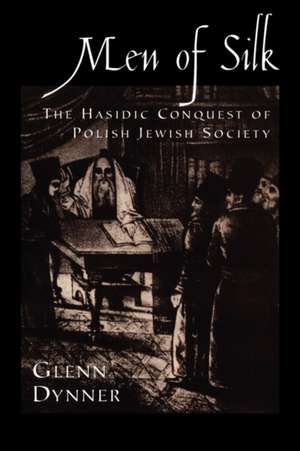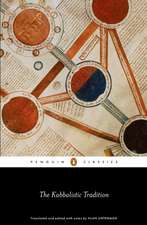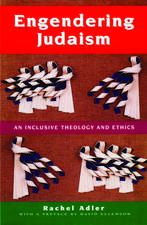Men of Silk: The Hasidic Conquest of Polish Jewish Society
Autor Glenn Dynneren Limba Engleză Paperback – 8 ian 2009
| Toate formatele și edițiile | Preț | Express |
|---|---|---|
| Paperback (1) | 339.71 lei 31-37 zile | |
| Oxford University Press – 8 ian 2009 | 339.71 lei 31-37 zile | |
| Hardback (1) | 356.63 lei 31-37 zile | |
| Oxford University Press – 18 mai 2006 | 356.63 lei 31-37 zile |
Preț: 339.71 lei
Preț vechi: 384.10 lei
-12% Nou
Puncte Express: 510
Preț estimativ în valută:
65.02€ • 67.01$ • 54.89£
65.02€ • 67.01$ • 54.89£
Carte tipărită la comandă
Livrare economică 20-26 februarie
Preluare comenzi: 021 569.72.76
Specificații
ISBN-13: 9780195382655
ISBN-10: 019538265X
Pagini: 400
Ilustrații: 4 black and white half tone, 2 line illustrations
Dimensiuni: 234 x 156 x 21 mm
Greutate: 0.56 kg
Editura: Oxford University Press
Colecția OUP USA
Locul publicării:New York, United States
ISBN-10: 019538265X
Pagini: 400
Ilustrații: 4 black and white half tone, 2 line illustrations
Dimensiuni: 234 x 156 x 21 mm
Greutate: 0.56 kg
Editura: Oxford University Press
Colecția OUP USA
Locul publicării:New York, United States
Recenzii
Dynner's book represents an important contribution to the previously understudied historiography of nineteenth-century Hasidism. His thorough and careful archival research, combined with his nuanced analysis of important zadikim, their ideology, and their social power, sets a new standard for the study of Hasidism. This is an indispensable volume for scholars and enthusiastic students of nineteenth-century East European Jewish culture and society.
Men of Silk is an original research study which contextualizes the emergence of Hasidism as a wide ranging popular movement taking place throughout central Poland between the years 1754 and 1830. The book presents recently discovered archival material from Poland pertaining to the social and cultural aspects of the Hasidic movement and introduces new questions concerning the internal and external dimensions of the development of Hasidism. The author contributes to a better understanding of the challenge offered to the social historian in the presentation of Hasidic Jewry in its social and political context, while not losing insight into inner Jewish life.
With precision and learning, Glenn Dynner manages to cut through so much of the multi-layered mythology surrounding the etiology, the organization, and the spread of hasidism in Poland. He provides a new, lucid account of its leaders, the lives of its devotees, and its relationship with government and Jewish society. He extracts much historical insight from seemingly recalcitrant hasidic hagiography, and draws on the widest range of sources -- hasidic, anti-hasidic, travelers' accounts, official, and more -- in what is a fascinating, fresh account of one of the most resonant Jewish religious ideologies in modern times.
The story of Hasidism has been told by both fervent believers and sworn secularists. This great east-European religious movement stood for several generations in the center of modern Jewish Historiography, and yet its diverse nature has been reduced to fit changing cultural modes, as well as long-forgotten political agendas. Men of Silk revises the story of Polish Hasidism. It offers a critical reading of inside and outside contemporaneous sources. Dynner's careful reading of the texts reveals Hasidism as a complex historical phenomenon, quite different from the simplistic portrait drawn by earlier schools of Jewish historians.
Dynner's book addresses the heretofore neglected but crucially important subject of 19th-century Hasidism, shedding much light on this vital chapter of Jewish (and Polish) history.
Men of Silk is an original research study which contextualizes the emergence of Hasidism as a wide ranging popular movement taking place throughout central Poland between the years 1754 and 1830. The book presents recently discovered archival material from Poland pertaining to the social and cultural aspects of the Hasidic movement and introduces new questions concerning the internal and external dimensions of the development of Hasidism. The author contributes to a better understanding of the challenge offered to the social historian in the presentation of Hasidic Jewry in its social and political context, while not losing insight into inner Jewish life.
With precision and learning, Glenn Dynner manages to cut through so much of the multi-layered mythology surrounding the etiology, the organization, and the spread of hasidism in Poland. He provides a new, lucid account of its leaders, the lives of its devotees, and its relationship with government and Jewish society. He extracts much historical insight from seemingly recalcitrant hasidic hagiography, and draws on the widest range of sources -- hasidic, anti-hasidic, travelers' accounts, official, and more -- in what is a fascinating, fresh account of one of the most resonant Jewish religious ideologies in modern times.
The story of Hasidism has been told by both fervent believers and sworn secularists. This great east-European religious movement stood for several generations in the center of modern Jewish Historiography, and yet its diverse nature has been reduced to fit changing cultural modes, as well as long-forgotten political agendas. Men of Silk revises the story of Polish Hasidism. It offers a critical reading of inside and outside contemporaneous sources. Dynner's careful reading of the texts reveals Hasidism as a complex historical phenomenon, quite different from the simplistic portrait drawn by earlier schools of Jewish historians.
Dynner's book addresses the heretofore neglected but crucially important subject of 19th-century Hasidism, shedding much light on this vital chapter of Jewish (and Polish) history.
Notă biografică
Glenn Dynner is a Professor of Religion at Sarah Lawrence College











